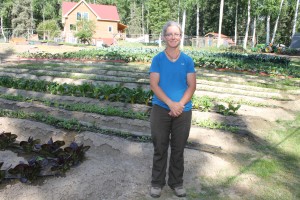Cripple Creek is home to farthest north certified organic farm
July 17, 2013

7/17/13
Watching the film “Food Inc.” in April 2010 changed Maggie Hallam’s life.
While she’d been gardening for years, the movie spurred her to get much more serious about food production. “It tipped the scales,” Hallam said. “I went from being a local shopper to being a local grower.”
Although Hallam was already familiar with the issues presented in the documentary, there was something the film that connected all the dots. “The portrayal put me over the edge,” Hallam said.
This is her third summer operating Cripple Creek Organics, a community supported agriculture enterprise. No stranger to agriculture, Hallam grew up on her family’s dairy farm in west central Wisconsin, helping milk 28 Guernsey cows and exploring the nearby forests. She earned a master’s degree of fine art in computer animation from the University of Illinois at Chicago and subsequently worked as an animator in San Francisco.
She and her (now) husband Bill Simpson drove to Alaska in 1996 “simply for the adventure of it.” Simpson became a chemistry professor at the University of Alaska Fairbanks.
Hallam has carefully and thoughtfully grown Cripple Creek Organics from a garden to a farm. In the spring of 2010 she cleared half an acre around her existing garden and put in a cover crop. That year she grew for one other family as a test run. In 2011, she had five CSA families and sold produce at the downtown Monday market. That fall she built a 20x72-foot high tunnel which helps extend the season. Last year she had 15 CSA shares and now she has 18. She also grows crops for Pita Place and Dandelion and sells extra produce on Fridays from 4 to 6 p.m. in the parking lot adjacent to Pita Place, 3352 College Road.
Transitioning from a home grower to a farmer has been more challenging than Hallam imagined. “The learning curve has been staggering,” she said. “I thought it would be straight-forward but it’s been very difficult.” One of the most difficult adjustments is to stay on top of successional plantings to keep up with supplying her CSA members throughout the summer.
One thing Hallam found important was to operate a certified organic farm. “I figured it was easier to learn how to be a certified organic grower right off the bat, rather than wait until it was more difficult to change my ways,” she said. “I was always an organic gardener, but there are definitely very specific guidelines and practices to be certified.”
Cripple Creek has the distinction of being the farthest north organic farm. Hallam went through the process to make it official with the Washington State Department of Agriculture. Initially she took a little ribbing from Rosie Creek Farm owner Mike Emers, who previously held that title. Hallam says, “I’ve known Mike since we first arrived in Fairbanks. I’m not sure I would be farming if I had not met Mike and watched his business evolve and grow over time.”
Being a certified organic farmer is more expensive, Hallam said, but worth it to her personally. She grows 40 different vegetables, some with numerous varieties. A part-time employee helps with planting, weeding and harvesting.
“Growing food is so rewarding,” Hallam said. She especially loves harvest days. “That makes it all worthwhile; that’s the real fun. It’s meaningful work.”
Hallam’s business philosophy is to try to break even and to stay out of debt as much as possible. Her only loan has been for a tractor which she needed for producing compost. “My goal is to do this at a sustainable level,” she said. “I need to find the size that is right for me to make a profit. I’m still in the learning curve.”
Eventually, Hallam may switch to selling wholesale but right now she is content with the CSA model. “I love interacting with customers; selling direct to the consumer is ideal.”
Another plus is that Hallam grows enough food to feed her family. “We eat something I grew every day all year round,” she said. “That’s extremely rewarding. That is the magical thing. I didn’t set out to do it but it came naturally with all this food.”
In the winters, Hallam concentrates creating her own line of rubber stamps and handmade boxes made with book binding techniques that she sells at holiday bazaars and on etsy.
Her daughters, Amelia, 11, and Layla, 5, are not that involved with the farm yet, but they enjoy the chickens and their mom’s Icelandic horse, Thokki. As the girls get older, Hallam would like to add more animals to the mix. “Right now I’m pretty much maxed out, to put it mildly,” she said.
Part of Hallam’s intent at Cripple Creek Organics is to give her children the farm lifestyle. “Currently 0.7 percent of our population is living on a working farm,” she said. “I wanted my kids to be in that 0.7 percent.”
Contact info:
http://cripplecreekorganics.blogspot.com/
www.facebook.com/CrippleCreekOrganics
This column is provided as a service by the UAF School of Natural Resources and Agricultural Sciences and the Agricultural and Forestry Experiment Station. Nancy Tarnai is the school and station’s public information officer. She can be reached at ntarnai@alaska.edu.


